
Nintendo has always been a pioneer when it comes to hardware design. Years before Wii and DS ushered in a new era of touch and motion control, Nintendo changed the face of gaming forever by introducing the analog stick on Nintendo 64. Before that, the launch of Game Boy meant that handheld gaming would never be the same again, and let’s not forget that the only reason a lot of us are even playing games today is because NES single-handedly revived the entire games industry after the great crash of 1983.
But as Wii U’s launch draws ever closer, I have a growing concern that Nintendo might actually be at risk from innovating itself out of the competition (and not in a good way). There’s already been a lot of debate about what the future might hold for Nintendo’s handheld department– my own included— but how might Wii U fare as cloud gaming continues to gain momentum?
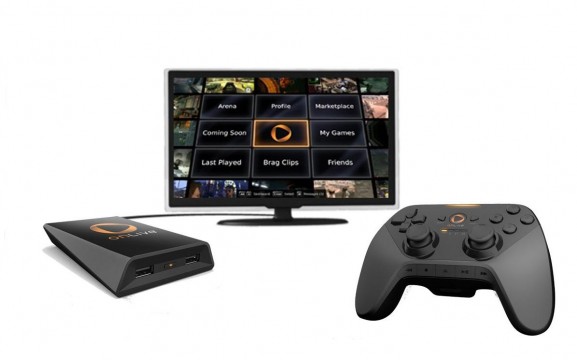
OnLive’s micro-console means all your favourite games are in one place (except Nintendo games, of course).
As you might already know, cloud gaming is an online on-demand gaming service, currently dominated by OnLive. To take OnLive as an example, players can stream games directly to their PC (or TV if you buy OnLive’s micro-console), eliminating the need for numerous different consoles, controllers and wires. Moreover, your PC doesn’t need to be the most powerful rig in the world to start playing– all it needs is a decent capacity to play video because the game is stored and rendered on a remote OnLive server. Its revolutionary video compression technology, combined with numerous algorithms to deal with any jitter or lag, can deliver up to 720p resolution at up to 60 frames per second. You do, however, need a good and reliable internet connection to get maximum performance. Over 50 top publishers have partnered up with OnLive so far, and just some of the big names in their 150+ games library include Assassin’s Creed II, Batman: Arkham Asylum (and soon to be Batman: Arkham City), and Deus Ex: Human Revolution.
Now cloud gaming is a potential problem for Microsoft and Sony as well, but no one stands to lose more from this than Nintendo, and the reason for this is because of their relationship with third-party developers.
One of the things Wii has never got right (and isn’t unlikely to before next year) is its third-party support. It’s consistently missed out on nearly all of this generation’s best multi-platform games, and I wouldn’t need many fingers to count the number of exclusive third-party Wii games that can stand proudly alongside the likes of, say, BioShock and Mass Effect, from both a sales and critical perspective. Out of the top 20 best-selling Wii games, just six of those have been developed by third parties (and two of them are Just Dance). Compare those figures with the best-selling PS3 and Xbox360 titles, and it’s a very different picture– Sony and Microsoft may have published a lot of them, but all of them have been developed by third parties.
But this is something we all know, so how does cloud gaming fit into all of this? Well, consider what type of games OnLive currently offers. You guessed it– third party titles. And, more importantly, they’re available now, not one or two years down the line. As excited as I was by the thought of playing Batman: Arkham City on Wii U, I quickly thought, “Why would I wait all that time to get a port when I could be playing it right now?”
Of course, games like Arkham City are also available to play on PS3 and Xbox 360 right now as well, but my main point is this– while I don’t profess to be a great expert on the nitty gritty details of what it takes to develop for OnLive as opposed to PS3 and Xbox 360 (or indeed Wii and Wii U for that matter), the option of OnLive’s micro-console and controller will mean that all three platforms will have relatively standardised control set-ups. I realise that some OnLive games are marked as keyboard and mouse only and thus don’t fall into this category, but add Wii U into that mix though and there’s still a slight problem.
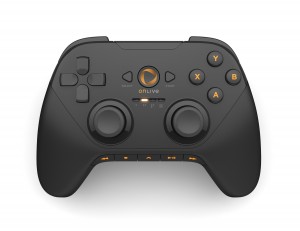
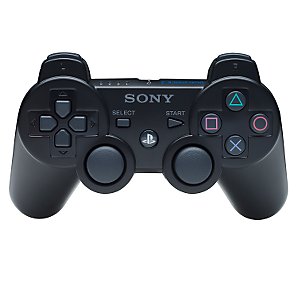
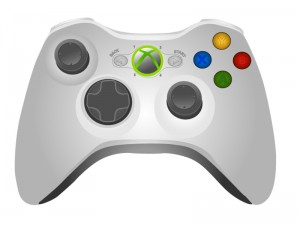
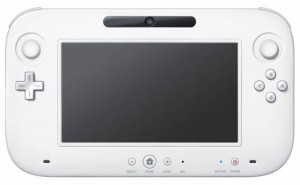
It won’t only be “war of the console horsepower” but also “war of the controller.”
While Wii U’s controller is definitely back in more traditional controller territory with its dual-analog pads and multiple trigger buttons, the way many developers have failed to grasp the potential of Wii’s control scheme doesn’t bode well for Nintendo’s next console. Moreover, if the rumours about Wii U only being able to support one of its tablet-like controllers (and thus having to rely on additional Wii Remotes for any multiplayer experiences) are true, then things are only going to get more complicated. When your budget for AAA titles can run up to $100,000 these days (the reported cost for Battlefield 3), development power needs to go where it counts– you want your game to reach the widest possible audience, and this is something cloud gaming systems like OnLive can provide in spades by offering one platform for a myriad of different titles. Likewise, the OnLive version’s controls work off the back of the pre-existing control specifications from the developers (with a few adjustments of course).
But if we look at the case of Battlefield 3 , we at Nintendojo reported only recently that a Wii U version of Battlefield is looking increasing less likely precisely because the development team are unsure how to best utilise Wii U’s control scheme. In an interview with Metro, Battlefield producer Patrick Liu said:
”I’m a big fan of Nintendo myself, just looking at what they’ve done with the Wii and the Wii U, but we have to come up with something that really uses their controls. And until we get that bright idea of what to do with the new controls, I don’t think there’s any point in making another version that’s just the same as everyone else.”
He also said that displaying a map on the Wii U’s tablet controller is “one of the most obvious features that we could do but I would think that we would try to do something even more innovative.”
But until that light-bulb moment happens, it’s easy to predict that a Wii U version of Battlefield is unlikely to ever see the light of day. With Wii U’s controls being so far removed from the competition, it’s foreseeable that we’ll also see many more games teeter on the edge of ‘maybe’ and ‘perhaps’ before finally falling by the wayside with an ‘actually, no we’re not bringing x game to Wii U after all’ kind of comment because it’s more hassle to design for. Arguably, Nintendo has been facing this threat from Sony and Microsoft for much longer than cloud gaming has been on the scene, but with yet another platform adopting a more standardised style of controller, it only works to further isolate Nintendo from providing us with the games we really want. I wouldn’t go so far as to say Wii U’s controller will act as an outright deterrent for third-party developers, but it certainly looks like it could be on its way to becoming one.
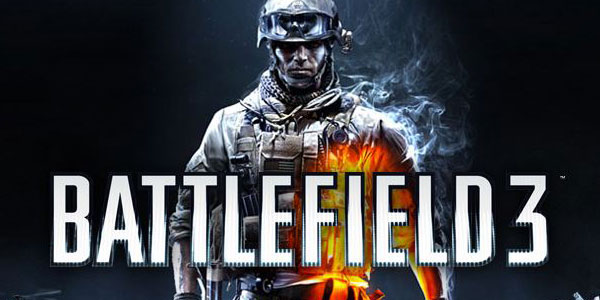
If we ever do see Battlefield on Wii U, it probably won’t be Battlefield 3, Liu said.
An extension of the “widest possible audience” conundrum also lies in how developers view Wii. As Lewis remarked in his recent editorial “Keeping Faith”, the Wii U moniker implies that it’s more of a sequel to Wii, catering to the same audience rather with the same kind of “gimmick” technology as opposed to it being a whole new machine truly designed for the “core audience.” Cloud gaming platforms like OnLive, however, are flying an altogether different flag by the very nature of the games they offer. It’s a system of convenience, specifically designed for gamers who know how to sift through the chaff and seek out what they want. It’s for people who don’t want to keep upgrading their system (specifically their PC) every few years to keep up with the latest games, and I don’t think it’s too much of a stretch to say that the vast majority of Wii owners don’t fall into this demographic. To get a better idea of just how some people in the industry regard Wii, have a read of this quote from industry analyst, Michael Pachter:
“The Wii audience isn’t sophisticated enough to know whether the game they’re buying compares favorably to, say Gears of War or LittleBigPlanet, because they probably don’t own an Xbox 360 or a PS3.”
He goes on to describe how Wii is a bit like McDonalds: “Nintendo has become the fast food machine. Sony is very much the high-end restaurant. And Microsoft is somewhere in between.”
Of course, I’m not saying that all Wii owners fall into Pachter’s supposed food chain analogy– the very fact that you’re here reading articles on Nintendojo is proof enough to buck that trend– but it’s a sad fact that lot of people bought Wii simply for Wii Sports and never played it again (or bought shed-loads of shovelware instead).
Developers have also indicated how skeptical they are about the validity of developing third party titles for Wii. Sega of America’s studio director, Constantine Hantzapoulos, cited the performance of Dead Space: Extraction as his “litmus test.” Due to its poor sales, he has deduced that “anyone past twelve or thirteen [years old] is playing 360 and PS3 shooters” as opposed to their own published Wii titles like MadWorld and The House of the Dead: Overkill. “Are we going to do more mature titles for the Wii?” he said. “Probably not.” Although this doesn’t rule out future titles for Wii U, there are a lot more forces working against it than for it at the moment.
Similarly, OnLive is a relatively inexpensive way to play these third-party titles as well. Without wanting to sound like an advert, OnLive gives gamers the option of buying games, renting them for 3-5 days, or having unlimited access to their entire library for a low monthly subscription fee ($9.99). Furthermore, the micro-console costs much less than a Wii. It may still be having some teething problems, but on the face of it OnLive is not only an incredibly flexible, affordable and attractive system, it’s also one which utterly undermines Nintendo’s long history of offering less powerful consoles for a lower price than its rivals. In this case, OnLive is essentially offering top-quality games for a fraction of the price incurred if you go down the PS3 or Xbox 360 route. If more gamers migrate toward cloud gaming platforms, which they can play on the go on their tablets as well (something Nintendo hasn’t really countered either), then it’s not just the controller issue that will be weighing on Nintendo’s mind– there’s also a risk that the very people Nintendo wishes to entice back into the Wii fold will ignore the entire console if there’s a cheaper way to play these must-have third-party titles.
I’m not saying Wii U won’t sell like hot cakes when it’s released, but I think the attractions posed by cloud gaming platforms in particular will pose a significant challenge for Nintendo if it’s ever going to truly win back third party developers and the gamers who follow them. Nintendo might know Wii U like the back of their hand, but it won’t be much good if everyone else fails to understand their hardware for the second time running.




 ShareThis
ShareThis







I love to get defensive on these points!:
“If we ever do see Battlefield on Wii U, it probably won’t be Battlefield 3, Liu said.”
I think that’s taken out of context. It would probably be the next Battlefield game.
He goes on to describe how Wii is a bit like McDonalds: “Nintendo has become the fast food machine. Sony is very much the high-end restaurant. And Microsoft is somewhere in between.”
The Only reason it’s “high-end” is because it’s higher on the $$ side of things. If they mean there is a lot of crap-ware for the Wii, there’s at least as much for any other console
I’m not sure on the development cost side of things, but haven’t third-party developers been talking about how much more expensive it is to develop for Wii? Not necessarily in development costs, I mean, just the fact that there’s so much more to compete with (i.e. they’re hard-pressed in grabbing consumer attention with games that aren’t Skyward Sword so the console may as well be filled with first-party games– remind you of a certain indigo console?). I think that’s the reason why people get the impression that there’s a lot of what you call “crap-ware” on Wii.
Other reason: it’s the bigger target. Wii’s been making money. People are jelly.
I think you’re right on both points, Williaint, but I have my own counter arguments for you :)
It probably would be the next Battlefield game as opposed to Battlefield 3, but would Wii U be able to handle it? If the next Battlefield comes in 5/6 years time (the time between Battlefield 2 and Battlefield 3), then I’m not sure it will. The PS4 and Xbox720 (or whatever you want to call them) should be on the market by then, and by that time I think Wii U will almost certainly be starting to feel the pinch in console power. As much as I hate to say it, I still think developers are going to migrate toward Sony and Microsoft simply because they can do more with the console and reach more people in the process.
Sony is definitely more up market on the $$ side of things, as you say, and I’m sure that other consoles have just as much shovelware as Wii, but I think one of the main reasons why Wii gets singled out so often on this front is because the amount of shovelware vastly outweighs what’s there at the top end. There might be just as many shovelware on PS3 and Xbox 360, but I think Sony and Microsoft have more gems at the other end to balance it out, making it appear like there’s apparently less.
Awesome article Katharine. I think the 8th-generation will definitely be a “war of the controller” as much as of horsepower, as you put it.
As for development costs Andrew, the Wii is actually the cheaper route! It costs about $5 million to develop a game for it.
But just as importantly, I’d agree that devs might get scared of the stiff first-party competition offered by Nintendo itself. And even if they did bring a hardcore game to the Wii, core gamers wouldn’t be caught dead owning a Wii exclusively. With an Xbox or PlayStation at home, they’d certainly go that route (who wouldn’t?).
Wii U and OnLive May Have Much More In Common Than You Think.
I have a Wii and OnLive. I have two OnLive micro-consoles (one came free with a game). The Wii and OnLive complement each other very well. I’m glad that I have OnLive in order to play the multi-platform games that did not make it to the Wii.
I have noticed something about OnLive’s library of games. Take a look at what games they have available and are getting in the future. Also, notice what publishers are releasing games for OnLive. Many of the big name games for OnLive: Assassin’s Creed…, Batman Arkham…, Metro 20…, Darksiders…, and Dirt… Are coming to Wii U. It seems that many of the same publishers that are willing to take a risk with OnLive are also onboard for the Wii U. Your use of Battlefield 3 as an example of a game that the developer would prefer to bring to OnLive over Wii U is hindered by the fact that there are no Battlefield games available for OnLive, yet they are considering development of the game for Wii U.
OnLive’s controls are adaptable from the PC’s keyboard and mouse, to the OnLive controller, but also to tablets. I believe that it is favorable that developers are making the effort to put Wii U’s special features to good use instead of simply rehashing exactly what is available elsewise. I am sure that I will prefer the Wii U versions of the games over their OnLive counterparts because of this.
Ideally, I would like to see the OnLive app on the Nintendo eShop on the Wii U and 3DS. However, it seems as though OnLive might feel threatened by the Wii U as the OnLive CEO tried to demonstrate that their compatibility with touch controls on tablets gives them comparable features to the Wii U controller. I hope they stop competing and try to complement each other because I would love to look at the OnLive Arena on the Wii U controller’s screen while watching TV.
I’m still curious what you people think the ps4 or xbox720 are going to do? I’m sorry but if you really think they are going to push forward a 7ghz machine capable of 2160p resolutions and using 4 1080p tvs so noone has to wait for the tv companies to make that possible than you are sorely mistaken. I always hear these arguments for better physics and ai and whatever if graphics can’t be meaningfully improved with just a bump in horsepower, but I don’t think people realize that this has more to do with the development process. Letting you break stuff might be realistic but it also means I have to either limit your use of this broken stuff or have to bug test every possible interaction possible with this theoretical code. We have the horsepower now. We just don’t have the developers or the gamers who will really care (gamers care but they won’t pay for the time it takes to do all this so they don’t care enough). They are rumored to have their new systems ready by 2013 at the latest and while I’m sure they’ll push something new. I don’t think we’ll see them pushing a $500 or $600 powerhouse box.
Your argument also fails because you play both sides. Systems that don’t need power because they play video and then theoretical systems that are significantly and noticeably more powerful than nintendos system. Nintendo could theoretically experiment with stream gaming on the WiiU but my personal opinion is that the average gamer isn’t quite ready to move gaming to the stream. My movie stops playing on netflix because my network went down and I can resume later and not too much hurt. but I might game differently and the idea that I die because of lag is already a problem in multiplayer online titles. The first time I die in a one player game because of network congestion and I’m going to wonder why I’d choose this method over a disc, but more importantly why would ms or sony make these super systems if cloud gaming is the future both those companies are interested in this market and they know that they lost to a souped up gamecube this generation because of something. It could have been their price. It could’ve been their lack of real innovation. They won’t purposefully miss that this time.